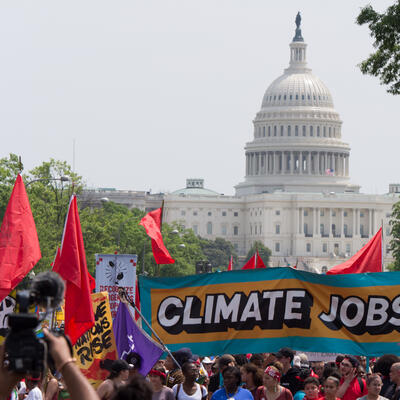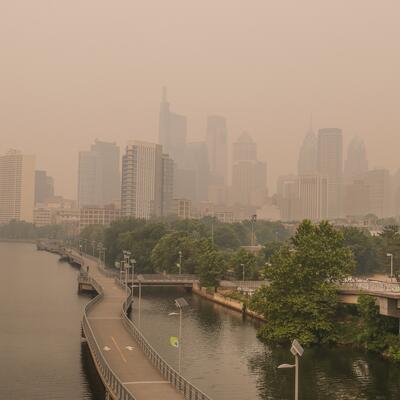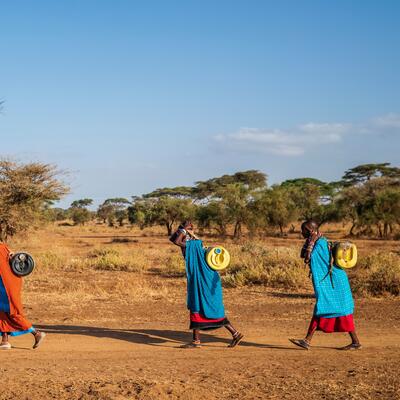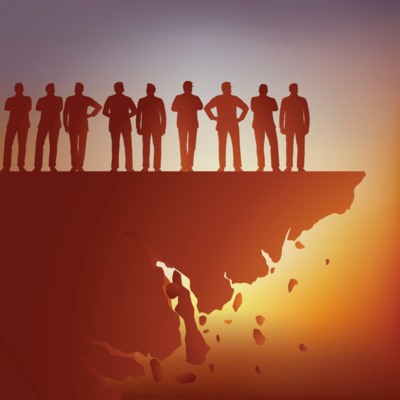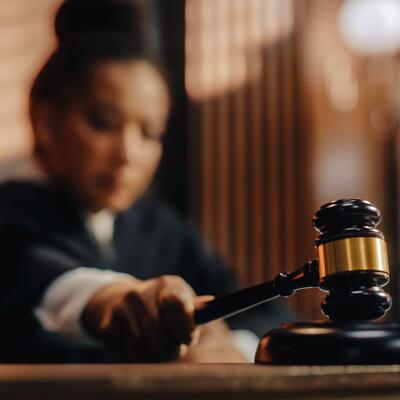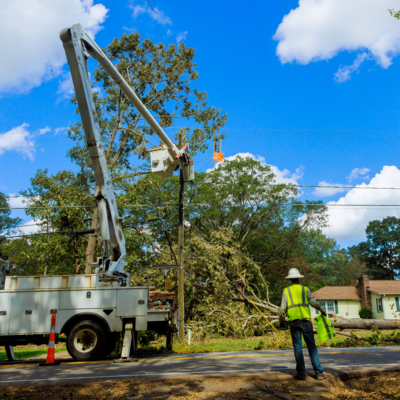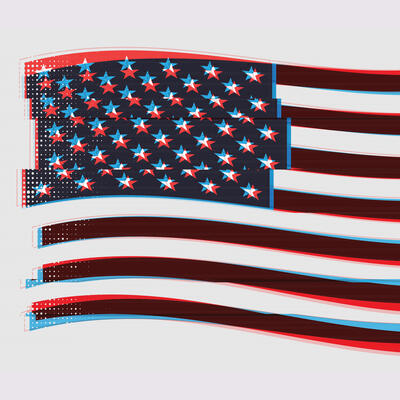
Distorted Democracy and the “Zero-Sum Game”
Guests
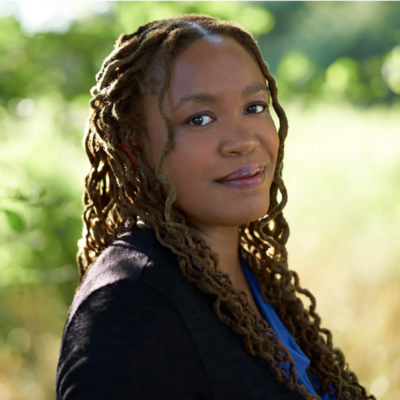
Heather McGhee
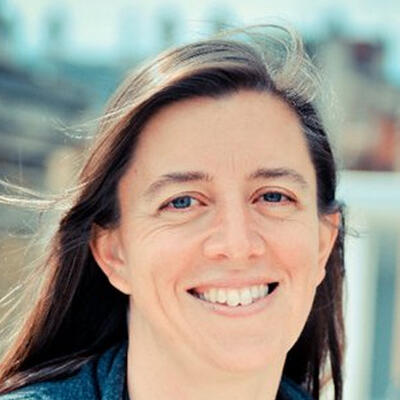
Rebecca Willis
Summary
In the US, we’ve become accustomed to climate – like nearly everything else – being politicized. Even when potential solutions might benefit everyone, a zero-sum mentality has taken hold, where there’s an “us” and a “them” and progress for "them" comes at the expense of "us."
“When you can be divided and get easily manipulated into cheering the destruction of things that could be beneficial to part of the American people," says political strategist Heather McGhee, “that's making life harder for everyone.”
McGhee is board chair of Color of Change, the nation's largest online racial justice organization, and author of the new book, The Sum of Us: What Racism Costs Everyone and How We Can Prosper Together. In it, she argues that racism in our politics and policymaking is distorting our ability to respond to big problems that require collective solutions by framing them as a so-called zero-sum game.
“The belief is that there's only so much to go around and what is good for an ‘other’ is bad for us,” she explains. “You can't dig into the social science data and see how much racial resentment became highly correlated ... with white public opinion on issues that nominally should have nothing to do with race during the Obama era.”
But does it have to be this way? In the UK, for example, climate politics are rarely marked by the partisan and racial divides of the American climate debate.
“We still have a very consensual approach to climate change,” says Rebecca Willis from Lancaster University, author of Too Hot to Handle? The Democratic Challenge of Climate Change, noting that the UK’s 2008 Climate Act has endured across conservative and progressive governments. Willis sees both a promise and a warning in US climate politics, as well as broader implications for global climate action.
“Maybe this is democracy’s moment,” she says, “maybe this is the time that we see that we need collective action because we sure as hell can't solve this one as individuals working through the market.”
RELATED LINKS:
The Sum of Us: What Racism Costs Everyone and How We Can Prosper Together
Too Hot to Handle? The Democratic Challenge of Climate Change
Full Transcript
Greg Dalton: This is Climate One. I’m Greg Dalton. For some people, progress on climate, like many other things, is a zero-sum game.
Heather McGhee: The belief is that there's only so much to go around and what is good for an “other” is bad for us.
Greg Dalton: In the United States, that belief is often racially tinged. And the zero-sum mentality can be hard to escape.
Rebecca Willis: The worst thing that can happen on climate is that we get into this false dichotomy of a healthy economy versus climate action.
Greg Dalton: Are racism and other false dichotomies distorting our ability to solve collective problems?
Heather McGhee: It's not just about cleaning up rivers and preserving charismatic animals. This is about humans and our relationship to power and how we own our power, and use our power.
Greg Dalton: Distorted Democracy and the Zero-Sum Game. Up next on Climate One.
Greg Dalton: How does viewing climate as a zero-sum game -- instead of as a problem requiring collective solutions -- distort our ability to act? Climate One conversations feature all aspects of the climate emergency: the individual and the systemic, the exciting and the scary, people who are in power and people who often don’t have access to power.. I’m Greg Dalton.
Greg Dalton: In the United States, we’ve become accustomed to climate -- like nearly everything else -- being a partisan, political issue. Not in the UK.
Rebecca Willis: We still have a very consensual approach to climate change. We don't have anything like the politicization of climate change that you have in the US or that you see in Australia.
Greg Dalton: Rebecca Willis is a Professor at Lancaster University, and author of Too Hot to Handle? The Democratic Challenge of Climate Change. We’ll talk to her later in the show about how the UK’s climate consensus has endured across conservative and progressive governments.
Here in the US, climate is just one of the many areas where a racially-tinged zero-sum mentality has distorted our ability to respond in ways that could benefit everyone.
Heather McGhee: When you can be divided and get easily manipulated into cheering the destruction of things that could be beneficial to part of the American people, that's making life harder for everyone.
Greg Dalton: Heather McGhee is the board chair of Color of Change, the nation's largest online racial justice organization, and author of the new book, The Sum of Us: What Racism Costs Everyone and How We Can Prosper Together. Many Americans breathed easier following the conviction of police officer Derek Chauvin for murdering George Floyd. I asked Heather about the connection between systemic racism, climate disruption, and the freedom to breathe.
Heather McGhee: Well, that’s a powerful provocation, Greg. I do believe that the fundamental sustainability of life on the planet is being threatened by these conjoined ills of racism and climate degradation. And I think it comes from a very similar root belief and set of supporting actions that exploits that refuses to nourish that refuses to preserve that is just a core part of settler colonialism and chattel slavery. That is something we are still struggling with on a very profound level. Our societies have not been set up to create the conditions for thriving human life, much less planetary life. So, that's why we are having trouble breathing.
Greg Dalton: Yeah, it’s something that's so elemental and fundamental, and we take for granted until we can't do it. I know that wildfires made climate personal for me, breathing in smoke for weeks last year. It came into my body and became part of my personal experience how is climate been personal for you?
Heather McGhee: I feel many injustices and dysfunctions personally. And not just because of my intersecting identities as a woman as a black person but also because of just who I am, it’s sort of a part of my personality and my character to feel I’m a pretty empathic person. And so, I don't think you should need to feel something personally in order to feel it for other persons. And yet it's absolutely true that of all the issues that I’ve worked on in my lifetime some that touched me personally and some that don’t as an advocate and as someone who designs and advances solutions to inequality. The issue of climate change certainly came sort of hurdling to the fore for me when I had my son. I remember the specific moment and I write about it that Some of Us when I was nursing him when he was a few weeks old. And I was scrolling, you know, with my free hand on my phone in the middle of the night and came across it was a Guardian article about the UN intergovernmental panel on climate changes report saying that we had 12 years to act. You know, when you’re holding a four-week old, 12 years feels like nothing, you know. And I have not originally intended to include a chapter on the environment and climate into Some of Us but I was when I had my son, I was well on the journey to write the book and I was finding these ways in which racism was the sort of core element of our dysfunction. And I thought well, isn’t it possible that racism is driving this country to sabotage its own future by ignoring the perils of climate change. Isn’t it possible that that's connected too? And so, I started asking the questions and doing the research and it turned out that it was.
Greg Dalton: That was a very powerful moment in the book. I've long understood that a lot of the opposition to cap and trade and climate action was because Barack Obama proposed it. But I had a deepened understanding reading your book and how the politics of the last 10 years have seen rabid Republican opposition to the Affordable Care Act and moving to clean energy. And you write about how much of that is because of the messenger and his skin's color. What’s the evidence for that?
Heather McGhee: Well, this was the question, right, I first asked because the subject of The Sum of Us is what racism cost everyone. And then the flipside of that is how we need each other in order to prosper. And so, as I'm investigating across the American economy, all of the different ways in which racism and our politics and our policy making, racism in our policy and -- racism, you know, as I’m investigating all of these different ways across the American economy how racism in our politics and policymaking is distorting our ability to respond to big problems and to advance collective solutions. It became clear to me that there was something there with climate that was under the surface about race and identity. And so, you know, I dug deep into the social science data and a number of different scholars found that this phenomenon called racial resentment which just put simply, a sort of the idea that black people don't work hard enough and get too many special favors from the government was highly correlated with anti-climate change solution belief, right, with climate denialism with opposition to action on climate change. And even within the Republican Party, Republicans with higher levels of racial resentment had higher levels of opposition to climate change action. And for me that began to make a lot of sense because as I discovered in the book. One of the core routes that racial resentment travels in our politics is through the permission structure around government. So, the idea is the government used to be really on the side of white supremacy, right, the government was the segregator was the enforcer of the racial hierarchy. And then in a very relatively brief period of time in the 1960s, suddenly, that changed. And so, that was a core betrayal for many white Americans and the resentment about that betrayal has been stoked. And that's the message that I like to make sure to center throughout whenever I'm talking about the Some of Us is that this is about a self-interested elite that has used political narratives to drive and increase racial resentment, particularly in the Obama era. But government, the antigovernment fervor among the right which is much stronger among white men than it is among other Americans, you know, has a lot to do with racial identity. And the idea that the government sort of is for lazy black people, right. And the government and the idea of the public puts people in common space. And that is something that people don’t want if they distrust the people who are in the commons, right. And so, it's clear that the government has to do something and act in a very big way, right, to address climate change. And so, therefore that's the link right is that you resent the government you resent people of color. And then on top of that you get the biggest climate actions that have been proposed from Paris to cap and trade to the clean power plant to the EPA to the CAFE standards on vehicles were all by the first black president at a time when in fact often not related to actions he was taking. You had these coal industry jobs declining often because of just market forces and natural gas. And so, there was this very clear zero-sum right. It was like this black man is taking jobs away from white men. And that's the narrative that the Koch brothers advertising and sort of the Fox News kind of right-wing media infrastructure really, really blared out was that idea of a zero-sum. You know the future that this black man and his government want has no place for white men to be in their traditional positions.
Greg Dalton: I think you quote Rush Limbaugh who talked about their cap and trade bill as this is reparations, right. He actually said it and I think there’s another piece where you say that if Bill Clinton's face had been on Barack Obama's bill, it would've been a very different reaction.
Heather McGhee: I think you can't dig into the social science data and see how much racial resentment became highly correlated. First of all, it spiked and it became highly correlated with white public opinion on issues that nominally should have nothing to do with race during the Obama era. And you can't look at all that data and not say that yes this is playing a huge role. Now the right-wing is very clear that they like to tarnish the entire Democratic Party with that same brush, right. They love to continue to stop progress on these issues even though Pres. Obama is no longer in office. But the visceral, right, someone was talking about how at one of the big conservative conferences called CPAC, you know, they sell merchandise in the hallways. And it's like “lock her up” and, you know, all this kind of stuff that you wanna wear on your T-shirt, right. Because you’re like, yeah, it’s a big part of your identity. And the merchants still had anti-Obama T-shirts and hats and stuff and anti-Hillary T-shirts and hats. And they had anti-Biden stuff and it just wasn’t selling, right, it’s not the same like visceral this is a part of my identity to show who I'm opposed to and it’s, you know, an uppity woman and an uppity black person.
Greg Dalton: Some people when Barack Obama was elected said, you know there's gonna be hell to pay for this. That there's gonna be a reaction like there was for reconstruction. Did you expect that such a backlash?
Heather McGhee: I did. I did. I think I didn't realize the degree to which it would infiltrate issues that weren't about race or that shouldn’t be about race, right. You know I think the president, Obama, thought that, you know, if he largely avoided race, he could do things that were in the broad public interest of the country like the Affordable Healthcare and Wall Street reform. And what he didn't realize is that the majority of white Americans would disapprove of the Affordable Care Act, and as they still do today right it's never reached 50% approval among white Americans because it is Obama care. Even the white Americans of the largest group uninsured.
Greg Dalton: Right. And as you often say, no Democrat has won the majority of the white vote since Linda Johnson passed the Civil Rights Act and said lost the South for a generation. You write about zero-sum racial hierarchy in the American economy that was built on stolen land stolen labor. Explain that zero-sum view and how white people and black people see it differently.
Heather McGhee: The zero-sum game is this idea that progress for -- that there’s an us and them and that progress for them has to come at the expense of us. And you know, just to be clear from an economic standpoint, it's false, right. We actually, you know, they are multipliers of economic activity and participation. The more everybody on the team it is on the field and able to score points the more the economy grows, right. We have Citigroup and McKenzie and the Federal Reserve Bank of San Francisco, all in the past year tabulating in the trillions the costs of our racial, economic divide. And yet the belief is that there's only so much to go around and what is good for an “other” is bad for us. And so, it then becomes easy for political elites who want to stop progress to paint anything as being good for your opposing team, right. And therefore, having people who nonetheless might benefit from whatever that benefit or a program or a reform is as losing out somehow. Now that is a view the way of seeing the world and particularly sort of race relations in America through that zero-sum lens is prevalent among white Americans and much less so among Americans of color. We simply don't believe that our progress has to come at white folks’ expense. And yet it really is that zero-sum which Some of Us identify as our major impediment to progress in this country and all the things we really need in life require collective action. And so, when you can be divided and get easily manipulated into cheering the destruction of things that could be beneficial to part of the American people. That's, you know, making life harder for everyone.
Greg Dalton: You’re listening to a Climate One conversation about Distorted Democracy and the Zero-Sum mindset. Coming up, how environmental racism ultimately hurts everyone living under the same sky.
Heather McGhee: The illusion that you can shunt all of the burdens of our polluting economy onto the current, kind of, wrong side of the environmental tracks -- it’s an illusion, it’s a lie.
Greg Dalton: That’s up next, when Climate One continues.
Greg Dalton: This is Climate One. I’m Greg Dalton, and we’re talking about race and environmental justice with political strategist Heather McGhee, author of The Sum of Us: What Racism Costs Everyone and How We Can Prosper Together. Heather writes that there's more alignment among leaders in the climate field now than there has been in decades, in part because they had been forced to see, quote, "the damage of white supremacy both inside and outside their ranks."
Heather McGhee: Yeah, I mean this is an issue that people who work in the climate field know much better than I am and I have enough friends in the field to have a little bit of a sense of the ways in which the vast majority of the resources in the professional climate and environmental infrastructure go to larger white lead in terms of their boards and their leadership organizations and that often organize mainly white communities. And the problem with that is that it doesn't actually reflect where the most natural and activated and concerned basis. You've got, there are lots of problems with it but the sort of the strategic problem with it the way that’s a distortion of what rationally might happen or strategically might be optimal is that according to the Yale Project on climate communication, there's a pretty significant gap in support enthusiasm for climate change solutions and environmental regulations between white people and black and brown people. And that black and brown people are much more the alarmed and concerned --
Greg Dalton: Well, they’re breathing it and they’re closer to the sources. It’s more directly part of their life.
Heather McGhee: Exactly. Whereas, you know, many white folks are sort of dubious and you know that comes back to that kind of the some moral view the antigovernment ethos the anti-science ethos, which has come up, you know, which is very much a part of our daily lives and in a pandemic now. But and so, that means that if you got this sort of big white led groups organizing and white communities and this natural base of people who want to be active underserved and under resourced and you have all these wonderful environmental justice leaders across the country. Many of whom are just homegrown, you know, moms taking action and you know people who were cleaning up their own backyards in a larger sense, right, their own neighborhoods and taking on polluters but who are under resourced. That’s a distortion, right, that's not strategic that's not smart. But the reason why I’m hopeful and why there's more signs of hope is that in the past few years I’ve had a real, you know, not always easy, but I think ultimately productive reckoning about those dynamics and the funders of the climate field have really been held more accountable for the impact of their funding priorities. And we got this framework of the Green New Deal which says we have got to do all at once right. We’ve got to have a just transition not just for the white men and coal fields, but also for the communities that have been the you know first and worse targeted by the industrial pollution. And that this has to be an opportunity for building community wealth and green jobs and we have to have this be the way we create a new economy embedded with our values. And then it's not just about cleaning up rivers and preserving charismatic animals. This is about humans and our relationship to power and how we own our power, and use our power.
Greg Dalton: You write about white Americans turn their backs on unions which had built the middle class during the Golden Age of shared prosperity from the New Deal to the end of the 1960s and you came to understand the reason was racism. Looking at the energy economy fossil fuel companies have a higher percentage of union labor than clean energy companies. How do you view that disparity?
Heather McGhee: Well, this is the fight, right. I mean, you know that is definitely something that labor activist and workers’ rights organizations and communities of color who are organizing to get those green jobs are very aware of. That often that these clean energy jobs are done by, you know, or run by exactly those kinds of coastal social liberals who are more from the low-cost labor gig economy orientation towards employment, right. So, these jobs are contract jobs they are gig jobs they have, you know, no benefits, no labor protections. There has not been the same receptiveness whether it's Tesla, right, which is a massive company that is totally resisted unionization where there's, you know, a lot of reports of terrible labor conditions inside. And yet, of course, it's this you know, sort of darling of the coastal elite, right, because everyone loves their luxury electric vehicle, right. So, that's in many ways a microcosm of that tension, right, that you just sort of have like the nice new gadget and you’re sort of bragging about the solar panel on your roof to your neighbor with their $2 million house, you know, with ocean views, or are you saying, like I actually want everybody to be able to breathe. And that doesn't just mean that there's not wildfires it means that people have enough money to meet their needs. And that’s really, you know, it's a harder question. Again, I think that our entire economy would be better off if we had more people who were able to breathe, the more people who weren't, you know, Greg, 4 out of 10 workers, adult workers before the pandemic weren’t paid enough to meet their basic needs. For housing, utilities, transportation, food, right. Four out of 10. And yet we've had just since the pandemic began minted 60 more billionaires and had the existing billionaire class have an over $1.3 trillion gain in their net worth to the degree that they could have paid for two thirds of the American rescue plan with just their pandemic profits alone.
Greg Dalton: I have a couple of quick questions for you and I like to ask you, Heather McGhee, the first thing that comes to mind. Just the first word or phrase when I mention this, unfiltered with reckless abandon. What’s the first thing that comes to mind when I say the effort to organize a union at an Amazon warehouse in Bessemer, Alabama?
Heather McGhee: Power.
Greg Dalton: What’s the first thing that comes to mind when I say union support for the Keystone XL Pipeline and other fossil fuel infrastructure?
Heather McGhee: Narrow.
Greg Dalton: Robert Bullard is widely recognized as the father of environmental justice. Who in your mind is the mother of environmental justice?
Heather McGhee: His wife, who is actually the lawyer who was bringing the case that he then was supporting with collecting the data.
Greg Dalton: Incinerator in a -- that’s a real interesting case because it was an incinerator in a middle-class black neighborhood. So it kind of goes against the idea that pollution sources are put in low income neighborhoods because of its low power, low property prices. It was actually a middle-class neighborhood in Houston. What’s the first thing that comes to mind when I say the arrest of Georgia State representative Park Cannon for knocking on the door of a room while Gov. Brian Kemp was signing a law restricting voting access?
Heather McGhee: Good trouble.
Greg Dalton: Finally, last one, what comes to mind the move by Evanston, Illinois to become the first U.S. city to pay for reparations for slavery?
Heather McGhee: Hear, hear.
Greg Dalton: Thanks for getting through that. My guest today on Climate One is Heather McGhee, the author of the Some of Us: What Racism Costs Everyone and How We Can Prosper Together. She's also the board chair of Color of Change the online racial justice group. President Biden recently announced his big push on infrastructure which includes a lot of investment in clean transportation grid modernization water infrastructure and new technologies. The pliant promises to address climate disruption and racial inequities still early, but how do you evaluate the Biden administration plan on climate justice?
Heather McGhee: Well, I have to say just in general this administration has really walked the walk when it comes to putting racial equity climate and inequality at the center of its plans. You know, the American Jobs Plan, which also is accompanied by and they want it to be paid for by the Made in America Tax Plan would end the $25 billion we spend paying fossil fuel companies to do what they do. And includes a lot of the main ideas behind the Green New Deal and what has been codified as the Thrive Act. And people should know that there is a massive sort of movement of movements called the Green New Deal Network that is really connecting environmental justice and traditional big green organizations and labor unions and workers’ rights and racial justice organizations. And they’re doing a really big recovery recessed during this upcoming recess from Congress and people can sort of Google “recovery recess” to find ways to be active to make sure their congresspeople know that they need them to move on these kinds of ideas. I would say in many ways that the American Jobs Plan the Infrastructure Bill is somewhat of the Thrive Act in, not in miniature that’s not fair, but it’s about half as big as it needs to be to really address the problem. And as of this recording yesterday, Mitch McConnell said that no Republicans would vote for the infrastructure plan, which is dispiriting and frustrating but not surprising. And it also is liberating because that means that Democrats know that they are going to be the only ones to vote for it. And so, they should make it as big as they need to make it in order to solve the problem to get us back in the game.
Greg Dalton: Yeah, there's no pretense of bipartisanship and it does seem like for people who are thinking Biden would be on that kind of FDR, LBJ, kind of scale president that he seems to be going big early. You talked about sacrifice zones for areas where the fossil fuel economy will kind of sacrifice Richmond or certain areas. That creates the perception that environmental racism doesn't affect white people. So, I’d like to just come back to that the idea if there are sacrifice zones does that mean that privileged white people are insulated. How does environmental racism affect, hurt white people?
Heather McGhee: This is something that I do talk about in that chapter the same sky. While not at all diminishing the ways in which the greatest environmental harms are borne by families of color. And the greatest sort of political indifference to those harms, right, is seen when it comes to families of color. It's also true that the illusion that you can shunt all of the burdens of our polluting economy onto the current kind of wrong side of the environmental tracks as one of the professors that I spoke with for the book put it, is an illusion it’s a lie, right. We live under the same sky and the way this works actually is that basically if often white decision-makers believe that they can be spared the burdens and the costs of pollution they won't demand that companies control the pollution and minimize the pollution. And that means there's more of it than there would be otherwise. And so, this is what an academic named Dr. Rachel Morello-Frosch found at Berkeley that in fact if you live in, if you’re a white person in a segregated community you have more carcinogenic pollutants in your air than if you're a white person in an integrated community.
Greg Dalton: So, integration’s good for your health.
Heather McGhee: Integration is good for your health. Anything that makes us believe that this zero-sum there can be profit on one side and loss on the other is going to distort our decision-making, right, it’s gonna make us less careful, less wise, right, less prudent. Because there's a solution that the cost can always be borne by some racialized other.
Greg Dalton: You are an empathic person. In 2016, I think the country got to see that when you are being interviewed on C-SPAN when Gary from North Carolina called in and asked you to help him with his prejudices and fears. When he said I am prejudiced, I saw you close your eyes and you seemed moved by his candor. That video went viral I think it was viewed more than 10 million times. You became friends with Gary who later read books by Cornel West and others. That conversation changed Gary from North Carolina; how did it change you? Did it change your ideas of a racist white man from North Carolina?
Heather McGhee: Yes and no. No, in the sense that I, you know, I had never fallen for the idea that there is just like bad racist people and good nonracist people, right. They never made any sense to me, right, it didn’t add up, right. It didn’t add up that just, you know, when my mother was born in 1950 that the country was just full of evil white people, right. And, you know, it was just like, well, that’s a little easy right for us to say, you know. So, I always had a fair amount of understanding that racist ideas are profitable for powerful people to sell to white people, right. And that there are some people who are desperate enough to buy those ideas and that it's the people who are selling those ideas that we have to hold accountable because they're doing it for their own profit. And, you know, today that’s the paid bullies in the corporate media and the right-wing billionaire plutocrats and their propaganda. And it's the economic and political elites who really materially benefit from having white people distrust unions and government. So, I was changed by knowing Gary, I have been changed by knowing Gary because it's just been the sort of really fascinating real-time example of sort of the a rural middle-aged pre-isolated white man, you know, and the sort of shifts in his consciousness that have happened over the during the Trump era, particularly. But I mean I think the reason why I responded the way I did is because I didn’t come in, you know, I don’t come in with a lot of, you know, I have a fair amount of pity for people who believe the lies of racism.
Greg Dalton: Yeah, there’s hurt underneath that anger. And as we end here, I’d like to ask how a person listening to this conversation can become a white ally concerning the issues we've been talking about.
Heather McGhee: What a great question, thank you for having me on, Greg. So, folks can join Color of Change, it’s the organization that I volunteer for in a board capacity which is the largest online racial justice organization. As well as for folks who are really focused on climate there is a coalition called the Climate Justice Alliance and that's the big umbrella group of environmental justice organizations and right now take action with recovery recess with the Green New Deal Network. All of those are ways you can take action to fight for a better future for all of us living under the same sky.
Greg Dalton: Well, Heather McGhee, it’s been a pleasure to spend time with you. Thank you very much for coming on Climate One. Thanks for your book.
Heather McGhee: Thank you.
Greg Dalton: Heather McGhee is the board chair of Color of Change, and author of The Sum of Us: What Racism Costs Everyone and How We Can Prosper Together. You’re listening to Climate One. Coming up, what American democracy could learn from climate politics abroad.
Rebecca Willis: Maybe this is democracy’s moment, maybe this is the time that we see that we need collective action because we sure as hell can't solve this one as individuals working through the market.
Greg Dalton: That’s up next, when Climate One continues.
Greg Dalton: This is Climate One. I’m Greg Dalton. The United Kingdom is in many ways the United States’ closest political relative. Yet climate politics in the UK are rarely marked by the partisan and racial divides of the American climate debate.
Rebecca Willis: It’s funny looking across the Atlantic because I see a promise and a warning all at once.
Greg Dalton: Rebecca Willis is a Professor at Lancaster University in Britain, and author of Too Hot to Handle? The Democratic Challenge of Climate Change. She describes the passage of the UK’s 2008 Climate Act as an incredible political moment.
Rebecca Willis: It was the first time that any country anywhere had passed such comprehensive legislation to tackle climate change as a systemic issue. And the amazing thing about it was that it had a cross-party political support. So, all the major political parties in the UK supported it. Announces more than 600 members of the national parliament less than 10 I think it was three or five voted against it. So, it was incredibly consensual. And it basically set the tone for climate politics in the UK. So, we still have a very consensual approach to climate change. We don't have anything like the politicization of climate change that you have in the US or that you see in Australia.
Greg Dalton: Right. So, at that point the labor government supported it. The leader of the conservative party, David Cameron supported it. US had kind of a political consensus around climate change at that time with Barack Obama and John McCain basically in the same place and that fell apart. So, in the UK in 2019 the British national policy was strengthened. What happened then?
Rebecca Willis: Yeah, so, you’re right. The original Act was passed by a labour government, the left-wing government. And then in 2019 it was basically updated to reflect what we now know about climate science that basically we need to get to net zero greenhouse gas emissions by 2050. And so, the Act was updated to include that science. So, what has endured is the scientific consensus on climate change being translated into political consensus when the science changed the politics changed. And in 2019, of course, that was under a conservative administration so, a right-wing administration, you know, continued the work of their political opponents really.
Greg Dalton: Is the conservative party in America -- how does the conservative party in America the Republicans compared to conservative parties in other countries and their stance on climate? Is climate just an anathema to right-wing parties and democracies around the world?
Rebecca Willis: Well, I think this is an open question at the moment. What we've seen in the UK is a sort of soft support for climate policy on the right. So, we've seen strong support for the targets in the ambition but what we haven't seen in the UK is a really comprehensive narrative. A story of how a right-wing government or a center-right government can tackle climate change. And I think that's gonna be the next big challenge because what we’ve seen definitely in the US and to an extent in the UK is the left owning the story about how you tackle climate change, and tying that story strongly to related stories around social justice and racial justice as well in the US. In the UK, I would say the left has been louder about climate than the right. But you don't have that confident narrative and I think that’s what to play for. I think it’s perfectly possible to construct a right-wing climate narrative it just hasn't happened yet. And it has to happen, right, because half the population of our country tends to vote right-wing and we need at least some of them to come with us. We can't do this just through left-wing votes. And so, articulating the climate case on the right is really, really important.
Greg Dalton: In Too Hot to Handle you referenced the hidden rules that govern the British Parliament and how white men "assume their way of being a politician is the natural or neutral way of going about things." How does race play into the response of democracies to climate disruption in the UK or elsewhere?
Rebecca Willis: I did this research with members of the national parliament in the UK. I did anonymous interviews with interviews with politicians from all the major parties. And what it showed to me is that politicians really care about how they are perceived how other people see them, and they developed this sort of strong sense of what a politician should do, how they should be presented. And there was some previous research about how black minority ethnic and they struggled because they were constantly having to decide whether they sort of stood up for -- they were always being asked the race question. They were always being asked to say what they thought about race issues in a way that white politicians weren't being asked, right. So, they were singled out for being a minority as a racial minority or as a woman because there are still few female politicians. They were always asked about racial issues or about gender issues. What really surprised me when I did this research was that climate was also sort of an issue that politicians felt like outsiders if they stood up for climate action.
Greg Dalton: It’s not a white masculine issue?
Rebecca Willis: Well, it’s not part of political traditions, right. And so, a politician who decides to stand up for climate action who tries to make a case about why we need to shift the basis of our economy shift the basis of our politics to deal with this literally planet threatening issue. If a politician decides to stand up for climate. They are pitching themselves as an outsider. You know, the politicians who I spoke to said quite strongly that they didn't want to be seen as freaks for speaking out on climate. They didn't want to be seen as climate change zealots. Those were their words not mine. So, there was really strong language about speaking out on climate change. And you felt that politicians were sort of self-editing that they were you know really worried about climate, but also worried about speaking out they were worried about their reputation about the sort of threat to their identity if they talk too much about climate.
Greg Dalton: One member of Parliament told you they've knocked on thousands of doors and people just don't talk about climate change. Research suggests that if people don't think they can affect the problem they are less likely to recognize its existence. S, does that pose a challenge for democracies that rely on public awareness to support for transformative change. If people aren’t talking about it the politicians don’t think it's important.
Rebecca Willis: Yeah, I mean obviously the relationship between politics and the people they represent -- sorry, the relationship between politicians and the people they represent is that’s the very fundamentals of politics, right. That's what politics is about. And climate is a really tricky issue when the politicians thinking about who they represent. And they look to the public and they look to public opinion and they think that people aren't very concerned about climate because people don't talk to politicians about climate change. But actually, I've come to think of this is as a bit of a vicious circle it’s kind of a circle of denial. Because what’s actually happening is that people are worried about climate change, you know, both sides concerned about climate change is really strong. And yet, people don't see that politicians standing up and talking about it. And so, you have this sort of silent standoff where politicians are saying I don’t want to speak out about climate change because I'm not sure I'll be supported for doing that. I'm not sure I’ll get votes because of it. And on the other hand, you have people thinking well, I am worried about climate change, but if it was that serious surely politicians would be leading on this, right. Surely, they would tell us what to do. And so, you have this sort of standoff where neither side is willing to make the first move, they’re both expecting the others to lead the way. And that's why I think that it’s really crucial that we get politicians who are brave enough to just stand up and say you know what climate this is the issue for politics.
Greg Dalton: You talked about how the right needs their own climate narrative. What would that look like? What would a right-wing conservative climate narrative look like?
Rebecca Willis: Well, you know, the big success of climate policy over the past 20 years has essentially been a story of economic and industrial progress, right. We've seen an incredible flourishing of renewable energy. We've seen prices and renewable energy fall like you've never seen before. We've seen how the industrial sectors being created. So, a right-wing narrative on climate could absolutely tie into the sense of industrial innovation of economic progress of, you know, winning in the world economy through investing in the technologies of the future. There’s also, you could also imagine how it plays to a kind of patriotic conservatism around, you know, protecting our country protecting the people that we love. You can imagine that narrative playing, right.
Greg Dalton: Climate nationalism, yeah.
Rebecca Willis: Yeah, I mean, okay, so there’s different versions of that. You can imagine quite an extreme climate nationalism, which is about shutting down the borders. You can also imagine the kind of soft right climate nationalism, which is about protecting the country that you love which is about, you know, looking at what threats might face us as a country over the next 20 or 30 years and thinking about you know what we do about those. And you know you look at any military risk register, right, you look at the work of the Pentagon you look at the work of the Ministry of Defense here and climate change is all over that in terms of the security risk, right. I mean it’s written in every other sentence. So, that's another way in which that's another part of the right-wing narrative on climate.
Greg Dalton: I spoke earlier in this episode with Heather McGhee who argues that a major impediment to political support for climate solutions in the United States is the idea of a zero-sum game that is something is good for you in this case, reversing climate injustice. It must be bad for us and that actually people of color and white Americans look at this differently that white people send to see a zero-sum and people of color, not so much. How do you see that dynamic playing out of UK or elsewhere?
Rebecca Willis: The worst thing that can happen on climate is that we get into this false dichotomy of you know a healthy economy versus climate action. So, to give you an example. I live in the north west of England where there is currently a proposal for a new coal mine. And this mine is for coking coal for steelmaking. And it has turned into this debate about jobs versus climate, right. Because this mine is offering 500 jobs in a place that desperately needs jobs. It's pretty clear from all the evidence that opening coal mines is completely incompatible with the climate goals we need to meet, right. We can't meet the Paris agreement and open new coal mines. That isn’t a political opinion not a scientific fact, right. And so, the community should never get to the stage where this coal mine was being offered to them. But it’s ended up in the situation where it’s seen as jobs versus the climate. And what really needs to happen and this is where we absolutely have to go next with the climate debate is that the only jobs on the table are green jobs, right. We should be confident enough about our climate story about our climate strategy the direction that our economy and our politics is going. That every single job offered to people in the north west of England is a climate compatible job. And yet what we've seen is not enough confidence. We've seen governments that have doing a bit of one thing a bit of another, you know, it's saying that we need to cut carbon emissions but agreeing to new mines new roads new airports is not really sure what it's doing about this. And that's actually hurting jobs that’s actually hurting the economy. And if it could set out a more coherent and confident plan, then that would be in the economic as well as the climate security interest of the country.
Greg Dalton: Though what I hear there is that sort of zero-sum that I win you lose and sort of, you know, jobs or climate that those are sort of false choices that manifests in different ways, and we have to kind of look at and rather than those false choices. What do you see when you look at American democracy now and how it's addressing climate disruption?
Rebecca Willis: It is funny looking across the Atlantic because I see a promise and a warning all at once. The warning is that we shouldn't take our consensus here for granted that it is an incredible thing that we've managed to have a consensus for now more than a decade. And if you look at countries like the US and Australia you can see how climate becomes a political football and that's really problematic. But there’s also a promise. And the promise for me is that what is starting to happen now in the US is a really confident political narrative around climate emerging from the Biden administration. And from the why the Democratic Party and it's a confident story about what the country looks like what it can look like and how you can achieve your aims as a political party and as a country while also tackling climate change. And that's really encouraging for me because the downside of the political consensus in the UK has been that we've all agreed that it’s a serious thing that we need to do something about, but we don't really have those debates about it. We don't test it. We don't argue about it. We don't think, you know, there isn’t really a proper political conversation about the very real social and economic changes that are needed. And I think instead we sort of try to tackle climate change through the back door through stealth. We haven't been open about those changes and the opportunities that they bring. And so, that's the promise for me of what we see in the US that you know it’s an open and lively political discussion.
Greg Dalton: It’s so strange to hear you say that because I think a lot of people here would say we like to have less politicization of the climate debate it’s been too politicize that where someone stands on climate change is highly correlated with their political identity and affiliation. And so, it's interesting to hear say that it’s -- I’m looking to this as a model.
Rebecca Willis: Maybe that’s a sweet spot, right, somewhere in the middle of the Atlantic is the sweet spot for climate politics. Ideally what I would love to see is absolute consensus on the goal, right. We have to get to net zero greenhouse gas emissions by midcentury, that's nonnegotiable as far as I'm concerned. The alternatives to that are just too horrible to contemplate. So, we have to have political consensus about the goal. But about the means of how we get there about the different policies and strategies whether we do it all through public spending. Whether we do it through taxing and carbon pricing how that relates to social policy and so on. That is surely the stuff of political discussion and there should be a difference between left and right about that. So, I would really like a good argument about how we meet the climate targets. Where it gets problematic in the US is that you know not all but a significant number of Republicans don't even accept the target, right. That's the problem that they don't agree that we need to be doing something about climate change.
Greg Dalton: We know that democracy flourish when economies grow in a relatively stable for a couple hundred years fossil fuels have driven that growth. How do you see the changing relationship between democracy stability and fossil fuels?
Rebecca Willis: Yeah, I mean it's a really interesting question isn’t it. I mean there’s some amazing work by the political theorist, Timothy Mitchell, who essentially says that what we are living at the moment is fossil based democracy effectively. That the fossil fuel economy gives us the kind of abundance and choice that allows democracies to function. And that if we move away from a fossil-based economy that means a completely different form of politics. And I think he's right to a certain extent, but I don't react to that with a kind of pessimistic therefore democracies doomed type, that's not my reaction. My reaction is instead that of course democracy will change because of climate change, but it can change for the better. We can, you know, it's really interesting if you look what happened through the pandemic that one of the outcomes for the pandemic is actually a realization that we can't get through these individuals right we need a state we need people to make decisions on the half things like you know things like lockdowns and vaccines, and all the responses to the COVID pandemic. They all require a strong and forward-looking state. And the same is true of climate. So, you know, maybe this is democracy’s moment maybe this is the time that we see that we need collective action because we sure as hell can't solve this one as individuals working through the market.
Greg Dalton: Right. A lot of people who think what’s government good for they’re certainly appreciating government de-risking the COVID vaccines and distributing, you know, creating those public goods that only government can do that corporations are not incentivized to do. Rebecca Willis is author of Too Hot to Handle? The Democratic Challenge of Climate Change, a professor of practice at Lancaster University in the United Kingdom. Professor Willis, thanks for coming on Climate One.
Rebecca Willis: Thank you. It’s been great.
Greg Dalton: You’ve been listening to a conversation about challenges to democracy from the climate emergency. To hear more Climate One conversations, subscribe to our podcast on Apple, Spotify or wherever you get your pods. Please help us get people talking more about climate by giving us a rating or review. It really does help advance the climate conversation.
Greg Dalton: Brad Marshland and Sara-Katherine Coxon are our Senior Producers; our producers are Ariana Brocious and Tyler Reed. Kelli Pennington is Director of Audience Engagement. Steve Fox is director of advancement. This program was edited by Devon Strolovitch and engineered by Arnav Gupta. Dr. Gloria Duffy is CEO of The Commonwealth Club of California, where our program originates. I’m Greg Dalton.

